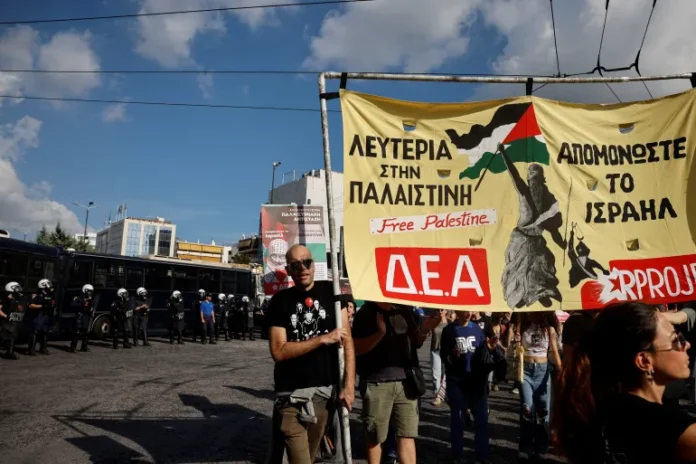Context of the Current Situation
The political landscape in Greece regarding Palestine and Israel has become increasingly complex, particularly in light of recent developments. In October 2023, a series of terrorist attacks in Israel marked the escalation of violence, prompting a swift military response from the Israeli government. This conflict has heightened tensions not only in the region but also within the international community, including Greece, which has historically maintained a delicate balance in its foreign policy towards both Israel and Palestine.
Following the violent events, Greece expressed initial support for Israel, emphasizing its right to defend itself. This alignment seemed to resonate with the broader European perspective, which often prioritizes Israel’s security concerns. However, this stance has been met with criticism from various factions within Greek society, particularly as reports emerged detailing the humanitarian crisis evolving in Gaza. International organizations highlighted the devastating impacts of military operations on civilians, raising questions about the moral implications of Greece’s foreign policy choices.
As Greece navigates through this multifaceted political crisis, the ongoing discourse surrounding Palestinian statehood becomes increasingly relevant. The intensity of the conflict and the rising humanitarian needs compel Greece to assess its relationships and responsibilities in a global context. This consideration is shaping debates within Greek political circles, as well as public sentiment, regarding the recognition of Palestinian statehood as a crucial step toward sustainable peace in the region.
Androulakis’ Call for Recognition
Nikos Androulakis, the leader of the Movement for Change (PASOK) in Greece, has been a prominent advocate for the official recognition of a Palestinian state. His recent initiatives reflect a strong commitment to international law and human rights, emphasizing the necessity to address the prolonged dispute between Israel and Palestine. By urging the Greek Parliament to engage in a debate on this pressing issue, Androulakis aims to restore Greece’s adherence to a resolution that was passed in December 2015, which asserted the significance of recognizing Palestinian statehood as a step towards peace in the region.
Androulakis’ motivation for this call stems from a broader ideological belief that a two-state solution is essential for achieving lasting stability and security in the Middle East. He argues that recognizing Palestine would not only affirm Greece’s historical support for self-determination but also align with the prevailing international consensus on resolving the Israeli-Palestinian conflict. His approach reflects a deep understanding of the geopolitical dynamics that complicate the situation, where advocacy for a recognized Palestinian state is often met with significant challenges.
To actualize this vision, Androulakis intends to utilize parliamentary proceedings as a platform to highlight the importance of the Palestinian cause and Greece’s role in facilitating dialogue. He sees these discussions as critical not only for promoting peace but also for reinforcing Greece’s diplomatic relationships with Arab nations, which have historically endorsed Palestinian rights. By fostering an environment conducive to constructive debate and resolution, Androulakis hopes to galvanize support for Greece’s commitment to a peaceful coexistence based on the principles of equality and mutual respect.
Opposition and Challenges
The proposal for recognizing Palestine, initiated by Androulakis, leader of the Movement for Change, has faced significant opposition and challenges within Greece’s political landscape. Key responses from various political parties reveal a landscape characterized by reluctance and discord. Notably, the ruling New Democracy party has maintained a cautious stance, which reflects a broader hesitance to adopt policies that could provoke tensions, both domestically and internationally. This lack of alignment with Androulakis’ proposal underscores a prevailing tendency within the government to prioritize stability over controversial foreign policy shifts.
Furthermore, the formerly governing party, Syriza, has also expressed opposition to Androulakis’ calls for Palestinian statehood recognition. Despite historically supporting similar measures, Syriza’s current leadership appears to align with a more centrist approach, potentially to avoid alienating constituencies or straining relationships with foreign powers. This shift showcases the complexities surrounding Greece’s geopolitical considerations, as parties navigate a delicate balance in their policy agendas pertaining to international conflicts.
One significant challenge faced by Androulakis is the fragmentation of political consensus on the Palestinian cause amid troubling geopolitical dynamics. The ongoing crises in the region often overshadow discussions on Palestinian statehood, leading to hesitancy among parties to engage in discourse that may be perceived as controversial. The humanitarian needs of the Palestinian people, although pressing, often take a backseat to more immediate domestic concerns, limiting the political discourse surrounding the issue. Consequently, the prevailing reluctance among political players to assertively advocate for Palestinian recognition amplifies the difficulties Androulakis encounters in garnering broad support for his stance. Such a political backdrop necessitates an ongoing dialogue that transcends mere partisan interests, ultimately signaling an urgent need for a cohesive approach in addressing the matter of Palestinian statehood.
Implications for Greece’s Foreign Policy
The recognition of Palestinian statehood by Greece carries several significant implications for its foreign policy and international relationships. This decision reflects a more assertive stance in regional geopolitics, signaling Greece’s commitment to the Palestinian cause and its advocacy for a two-state solution. Such recognition could fundamentally alter Greece’s dealings with Israel, historically characterized by cooperation and strategic partnerships, particularly in areas such as defense and energy. As Greece embraces a more pro-Palestinian posture, it may encounter challenges in maintaining its amicable ties with Israel, potentially leading to a recalibration of cooperation frameworks in various sectors.
Furthermore, Greece’s position could influence its standing within international organizations and forums, affecting its partnerships and initiatives regarding Middle Eastern issues. The balance between supporting Palestinian aspirations and managing existing relationships with Israel is delicate, and Greece’s diplomatic approach must navigate these complexities carefully. In addition, Greece may find itself at the forefront of humanitarian efforts directed towards Palestine, enhancing its role as a promoter of peace and stability in the region. This humanitarian engagement could garner positive reception from broader segments of the international community and resonate with those advocating for human rights.
In this dynamic context, Greece must exercise strategic acumen in order to balance its foreign relations. The implications extend beyond bilateral ties, encompassing multilateral relationships and alliances within the European Union and the Mediterranean region. As Greece advocates for Palestinian statehood and offers humanitarian assistance, it increases its visibility on the international stage, potentially positioning itself as a mediator in the Israeli-Palestinian conflict. Therefore, the recognition of Palestinian statehood serves not only as a moral stand for Greece but also as a pivotal influencer in its foreign policy trajectory.



Deference to author, some good selective information.